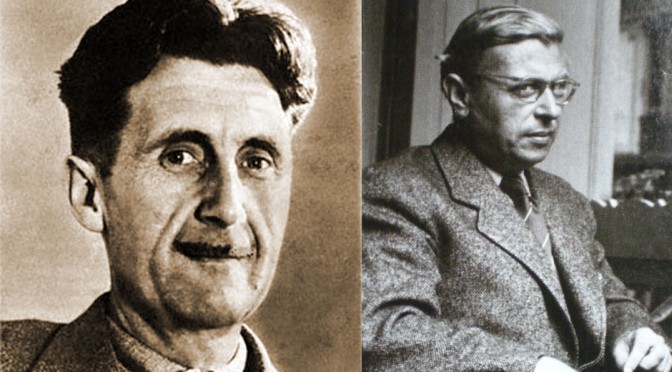George Orwell never dabbled much in philosophy “proper,” despite the highly political underpinnings of his work. But when philosopher Jean-Paul Sartre wrote “The Portrait of the Antisemite” in 1945, Orwell was offered an opportunity to give his thoughts on the famous French existentialist.

That letter, to his publisher, was actually about his final attempts at completing his famous book “Nineteen Eighty-Four.” It’s only in the final paragraph that Orwell decides to warn his publisher that he intends to give Sartre a “good boot,” before wishing to give everyone his love.
Orwell would indeed go on to give Sartre a “good boot.” As Open Culture notes, Orwell published his review of Sartre’s book the next month, in November of 1948.
Antisemitism is obviously a subject that needs serious study, but it seems unlikely that it will get it in the near future. The trouble is that so long as antisemitism is regarded simply as a disgraceful aberration, almost a crime, anyone literate enough to have heard the word will naturally claim to be immune from it; with the result that books on antisemitism tend to be mere exercises in casting motes out of other people’s eyes. M. Sartre’s book is no exception, and it is probably no better for having been written in 1944, in the uneasy, self-justifying, quisling-hunting period that followed on the Liberation.
At the beginning, M. Sartre informs us that antisemitism has no rational basis: at the end, that it will not exist in a classless society, and that in the meantime it can perhaps be combated to some extent by education and propaganda. These conclusions would hardly be worth stating for their own sake, and in between them there is, in spite of much cerebration, little real discussion of the subject, and no factual evidence worth mentioning.
We are solemnly informed that antisemitism is almost unknown among the working class. It is a malady of the bourgeoisie, and, above all, of that goat upon whom all our sins are laid, the “petty bourgeois.” Within the bourgeoisie it is seldom found among scientists and engineers. It is a peculiarity of people who think of nationality in terms of inherited culture and property in terms of land.
Why these people should pick on Jews rather than some other victim M. Sartre does not discuss, except, in one place, by putting forward the ancient and very dubious theory that the Jews are hated because they are supposed to have been responsible for the Crucifixion. He makes no attempt to relate antisemitism to such obviously allied phenomena as for instance, colour prejudice.
Part of what is wrong with M. Sartre’s approach is indicated by his title. “The” anti-Semite, he seems to imply all through the book, is always the same kind of person, recognizable at a glance and, so to speak, in action the whole time. Actually one has only to use a little observation to see that antisemitism is extremely widespread, is not confined to any one class, and, above all, in any but the worst cases, is intermittent.
But these facts would not square with M. Sartre’s atomised vision of society. There is, he comes near to saying, no such thing as a human being, there are only different categories of men, such as “the” worker and “the” bourgeois, all classifiable in much the same way as insects. Another of these insect-like creatures is “the” Jew, who, it seems, can usually be distinguished by his physical appearance. It is true that there are two kinds of Jew, the “Authentic Jew,” who wants to remain Jewish, and the “Inauthentic Jew,” who would like to be assimilated; but a Jew, of whichever variety, is not just another human being. He is wrong, at this stage of history, if he tries to assimilate himself, and we are wrong if we try to ignore his racial origin. He should be accepted into the national community, not as an ordinary Englishman, Frenchman, or whatever it may be, but as a Jew.
It will be seen that this position is itself dangerously close to anti-semitism. Race prejudice of any kind is a neurosis, and it is doubtful whether argument can either increase or diminish it, but the net effect of books of this kind, if they have an effect, is probably to make antisemitism slightly more prevalent than it was before. The first step towards serious study of antisemitism is to stop regarding it as a crime. Meanwhile, the less talk there is about “the” Jew or “the” antisemite, as a species of animal different from ourselves, the better.
Martin Tyrrell mused that it was likely Orwell had no appetite for the “gratuitous cleverness” of philosophers.
In Orwell’s writings, fiction or non-fiction, there are few good intellectuals. Where they appear, then it is usually only to spin words without meaning. At best, they are inadvertently confusing; at worst, deliberately so: Marxists, for example, or nationalists or Anglo or Roman Catholics. Or Jean-Paul Sartre.
Orwell, in his rules for writing, stresses the importance of clarity, encouraging writers to avoid jargon, cut out excessive words, and ask “Could I put it more shortly?” That stylistic choice often grates against continental and French philosophers, who often prefer to write in a more literary style.
Orwell’s take on Sartre wasn’t his only notable review. He also reviewed “Mein Kampf” in 1940, arguing that Hitler’s future was one where “nothing ever happens except the training of young men for war and the endless breeding of fresh cannon-fodder.”
[H/T Open Culture]

